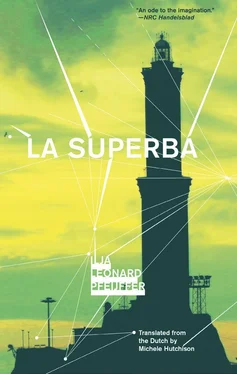“And even though I’m legal for now, I’m still careful not to go out after a certain time of night. A black man on the loose after nine p.m., the carabinieri get very nervous about that, I can tell you. There’s a sticker on my house that says:
derattizzazione in corso
non tocare le esche
“Do you know what that means? I’ve looked it up in my dictionary. It’s the joke of the century. It means that pest control is underway and it’s inadvisable to touch the bait. While the rats inside the building clearly aren’t put off by the sticker, or maybe they are, in the sense that they take more care not to touch the bait, I’m personally more and more inclined to a metaphorical interpretation of the text. Since if the real rats aren’t being exterminated, it must mean something else, mustn’t it? You’re a writer, you know that kind of thing. That’s how metaphors work, isn’t it? And who lives in the tumbledown buildings with the stickers on them, aside from the rats? Exactly. And that’s exactly how I feel in this Promised Land called Europe: like the rat the stickers on my house warn people about. And the bait that brought me here — the guaranteed riches, the Mercedes, watches, and sunglasses — can’t be touched. I feel like a pest that should be exterminated in this city I once fell in love with from the deck of a ship. The truth is that I’m a rat to everybody in this city, even to you, Ilja.”
18.
I denied this most emphatically.
“Can you maybe lend me fifty euros, Ilja?”
“Why don’t you go back, Djiby?”
“Are you listening to what you’re saying?”
“That’s not the way I meant it. I…”
“I know you didn’t mean it that way. No one who says that kind of thing really means it. That’s the problem with us black people. The whole time everyone keeps saying stuff about us that they don’t mean. But they do say it. And you’re a good person, Ilja, I’m sure you know it. You’re not a racist, no more than those hundreds of shop, bar, and restaurant owners I’ve asked for a job are racists. They simply don’t have any work for me. And you’re paying for my beers because I’m telling you my story, but you’d never lend me fifty euros. We’ll never be real friends. You’re too afraid for that, you think I’ll ask you for another fifty euros then and you won’t be able to refuse because we’re friends. Some people are afraid of me because I’m black, but there aren’t actually that many of them. Most are afraid of me because I’m poor. They can tell because of my black skin. And if a person’s poor, you’re better off keeping your distance. Everyone knows that, even in Africa. It doesn’t have anything to do with racism, even though the fact you’re rich or poor has everything to do with the color of your skin. But it’s the same in Africa. The way a white in our country is rich by definition, a black man here is by definition poor.”
“Do you really want to borrow fifty euros?”
“I know you’re only asking so you can write down that you’ve asked me. That’s the only reason you’re talking to me anyway, so you can write me down. And as soon as you have enough material, we’ll smile for the camera one more time and after that, we’ll never see each other again. You won’t avoid me, but you won’t look for me, either, or invite me to your table. But don’t feel guilty. It’s fine. I want my story to be told.”
He smiled. “Order me another beer. Make it a big one because all this talking has made me thirsty. What did you ask again? Why I don’t go back? To Senegal? Are you kidding me? I’ll tell you exactly why, but first more beer.”
19.
“Do you know how much it cost to get me to Europe? And by that I don’t mean everything I went through and the fact it nearly cost me my life several times. What I’m talking about here is money. I worked it out. Everything added up would be about three thousand euros in your currency. Three thousand. Do you know how much money that is? For a boy in Africa? For a boy in Africa with his family? My uncle has a good job. He works in a steel factory just outside of Dakar. It works out to about a hundred euros a month. In Senegalese terms, that’s a good income. He’s the richest in my family, anyway. My father has a barbershop and my mother works as a seamstress. Maybe combined they make it to a hundred euros a month. And my mother’s work is drying up because the Chinese do it even cheaper. A good friend of mine runs a shop for used mobile telephones and spare parts, but he doesn’t have many customers and the margins are narrow. Apart from that, there’s nobody in my family with a regular income. I didn’t have any work myself and neither did my two brothers. From time to time, I helped in my friend’s shop and occasionally I had temporary work. The same goes for most of my good friends. Can you imagine how big a sacrifice it was for my family and friends to get together the three thousand euros necessary for my journey? And they all contributed. My father even took out a loan and two of my friends did the same. They got into debt for me, Ilja. But they did it with conviction. They saw it was an investment that would pay out ten or a hundred times. It was guaranteed I was going to be rich, after all. By contributing to the costs of my travel, they bought the right to a share of my immeasurable riches.
“And then you just coolly ask me why I don’t return to Senegal? Do you think I’d still have friends? Do you think my family would welcome me into their arms like a prodigal son? They’d see me coming, their mega investment for whom they’d gotten themselves into major debt, returning penniless, empty-handed, without cars, gold bars, washing machines, luxury yachts, smartphones, diamonds, or even a dishwasher, come to explain that alas, nothing worked out, that he slept surrounded by rats, with eleven fellow countrymen, was able to find no other work than carrying heavy things from time to time, and that the whole idea that you automatically get rich in Europe was a misunderstanding as far as he was concerned.”
“But…”
“Hang on Ilja, I’m still talking. Because on top of that, I’d be the first.”
“What do you mean?”
“Everyone in Senegal knows that it’s a long way to Europe, fraught with danger, which only the strongest survive, making it an investment accompanied with large risks, so the family has to choose the best candidate to undertake the journey. But everyone also knows that every Senegalese who has actually managed to reach Europe has become rich. If I were to admit I hadn’t managed it, I’d be the first one not to manage it. Can you imagine what kind of shame it would bring upon me?”
“And the eleven other Senegalese sleeping among the rats with you? And all the others on the Via di Pré? It’s a fairy tale.”
“It’s a fairy tale everyone in my home country continues to believe because none of us has had the courage to be the first to admit that it’s a fairy tale.”
“But sooner or later they’ll realize that their investment hasn’t paid out?”
“What do you mean, Ilja?”
“That no money’s coming.”
“But of course money’s coming.”
“How then?”
“I send a couple hundred euros a month. Through Western Union. I have to.”
“And that’s how you sustain the fairy tale.”
“I don’t have a choice. That was the deal.”
“How do you get the money?”
“I borrow it. We all do.”
“And how are you ever going to pay it back?”
“I came here with a dream of a better life. In the meantime, I got lost in that fantasy. That’s my story. That’s what I had to say. Funny, isn’t it?”
20.
A few months later, I was sitting on Caffè Letterario’s terrace on my own, thinking about things I’ve already forgotten, when I saw my Senegalese friend again. He saw me, too, and came over. It seemed like he’d been looking for me. It worried me because it could only mean he wanted something from me. What was his name again? I should be more careful about making friends with those kinds of people. At the end of the day, they all expect you to help them. Of course, I hadn’t really made friends with him, don’t worry. I was simply curious about his past. Let’s call it research. My interest was less in him than his horror stories about his hellish journey to the Promised Land, Europe, which I hope I’ll be able to use in my novel, where discrimination against immigrants will be a major theme. But professional interest is all too often confused with friendship in those cultures. He had a desperate look on his face. What was his name again? Djiby. What does it matter. But, well, I think it was Djiby. He always looked desperate, but now more than usual. I prepared myself for the worst and resolved to be nice to him but not to give him money under any circumstances.
Читать дальше












